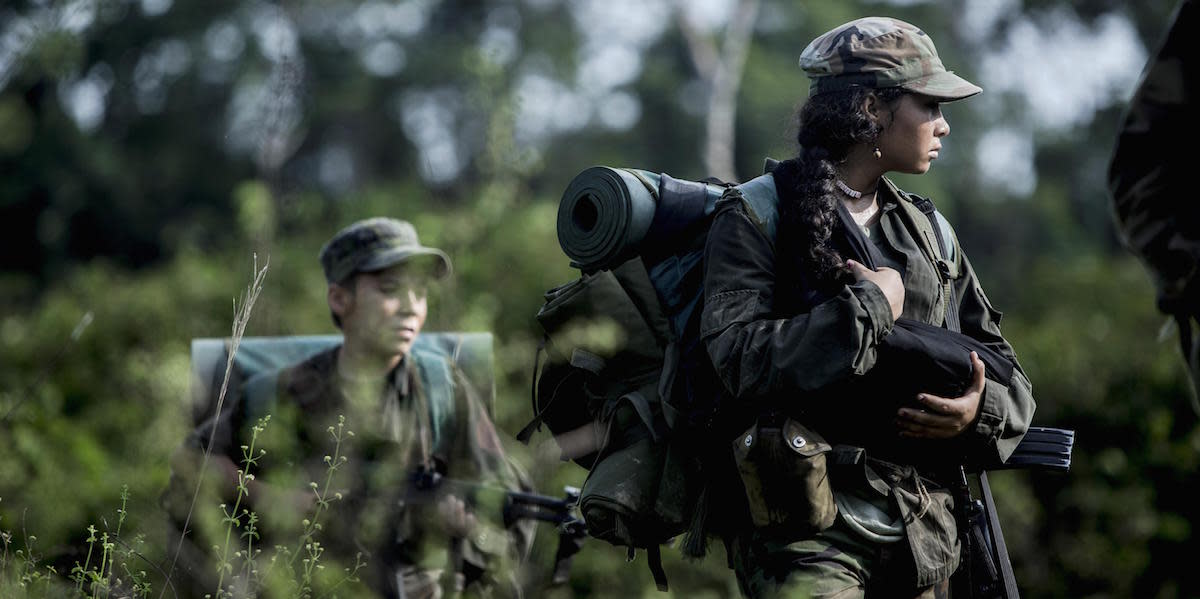Cannes Film Review: ‘Alias Maria’

A sobering social-issue movie set in a milieu so different from our own that it practically feels like science fiction, Jose Luis Rugeles’ “Alias Maria” embeds audiences among a group of Colombian guerrillas, where children are forced to fight alongside adults, and where the young ladies in the group are used for sexual recreation, but forbidden to bear children. Stories like this can be arduous to watch, and here, the unease is amplified by long, dialogue-free passages in which a small squad of fighters — including teenage Maria, who protects an obvious secret — find time to reevaluate their allegiances while undertaking a dangerous mission. The movie itself falls short of its objective, failing to engage as a straightforward thriller, but represents the iceberg-tip of a far larger effort, a grass-roots re-educational campaign the sheer importance of which should land “Alias Maria” countless more fest berths after Cannes.
Compelled by a noble impulse to bring international attention to Colombia’s ongoing child-soldier problem (where, according to Human Rights Watch, as many as 11,000 minors have been enlisted), Rugeles entered into the project with the best intentions in mind, even going so far as to “recruit” his cast from the same parts of the country where children were at highest risk of being turned into underage soldiers, using workshops and interview sessions as an opportunity to suggest alternatives to the local violence.
From the nearly 2,000 kids Rugeles’ team interviewed, the helmer selected Karen Torres to play his title character, a 13-year-old girl who barely looks old enough to have put aside her dolls, yet seems scarily at ease with a machine gun strapped over her shoulder. Already indoctrinated into the guerillas’ cult-like system by the rebels’ dictatorial commander, Maria knows the group’s strict no-child policy, but stares in wonder as the leader’s female companion openly violates the rules, giving birth in the film’s first scene.
Rather than raise the infant directly in harm’s way, the commander orders Maria and a small team of young soldiers led by her b.f. Mauricio (Carlos Clavijo) to deliver his baby to a sympathetic local doctor, who has agreed to shelter the infant. But making the trip through the jungle is no small task, especially with a crying newborn threatening to give away their location at every step: The area is crawling with paramilitary fighters, whose flares illuminate the night sky. Meanwhile, the rest of Mauricio’s team is no more mature than Maria, with the weak link being young Yuldor (Erik Ruiz), his age barely in the double-digits, whose thinly veiled panic makes him the group’s most relatable character.
In contrast with numerous recent child-soldier stories, from manipulative Salvadorian drama “Innocent Voices” to the entire mini-genre emerging in response to similar issues in Africa (like Oscar-nominated short “That Wasn’t Me”), Rugeles opts for an austere art-film style, rather than the more conventionally accessible melodramatic approach that might help the film reach the widest possible international audience. Though informed by research, Diego Vivanco’s script withholds much of the essential context viewers need to make sense of its long wordless stretches, while Rugeles’ execution fails to generate the tension that approach requires.
To his credit, Rugeles resists the sexist Latin American social-horror-story cliche of casting the most attractive female actress he could find, likely intending to make a statement that audience identification should be driven by more than mere hormones. Like so many of the helmer’s choices, however, that decision is admirable in theory, but impractical in execution — not simply because Torres’ Maria isn’t nearly as beautiful as, say, the one Catalina Sandino Moreno plays in “Maria Full of Grace,” but because Torres hardly seems capable of emoting at all. Tough and stoic, she remains silent for minutes on end, leaving us to wonder what, if anything, is going on behind that inscrutable face, framed in such tight closeup.
Sometimes, the visual storytelling helps to compensate for our confusion, as when Maria discovers that she’s lactating (and therefore — surprise! — must be pregnant), or even more dramatically, when she stashes the crying baby in a pile of leaves while being pursued by paramilitaries, then panics when she can’t remember her hiding place. But more often than not, Torres tends to blend in with the film’s desaturated green-brown world, color-timed to the degree that the sun practically glows when it manages to make it through the dense canopy above. She’s not so much camouflaged as partly dead inside, her only hope at redemption being to run away and begin the difficult re-assimilation process.
As fellow humans, we should care about the commander’s baby, which she carries, but it’s Maria’s unborn one that keeps us interested here. In stronger hands, “Alias Maria’s” setup could have supported a thriller every bit as gripping as “Children of Men” — if only the helmer shared Alfonso Cuaron’s instinctive gift for dramatic tension, but this film drags when it should electrify, all but limiting its impactful message to special screenings and festivals. Where suspense ought to kick in, this primeval war zone instead succumbs to a certain restlessness, leaving audiences to ponder the constant shriek of insects or the umpteenth closeup of tiny red ants carrying far more than their weight across the jungle floor — metaphors sure to escape no one’s attention, even if the film can barely manage to sustain it.
Related stories
Cannes: France's Sophie Dulac Nabs Rugeles' 'Alias Maria'
'Ixcanul' Tops Cartagena, Continues Fest Triumphs
'600 Miles,' 'Ixcanul,' 'Alias Maria' Play Colombia's Cartagena Festival
Get more from Variety and Variety411: Follow us on Twitter, Facebook, Newsletter

 Yahoo Movies
Yahoo Movies 